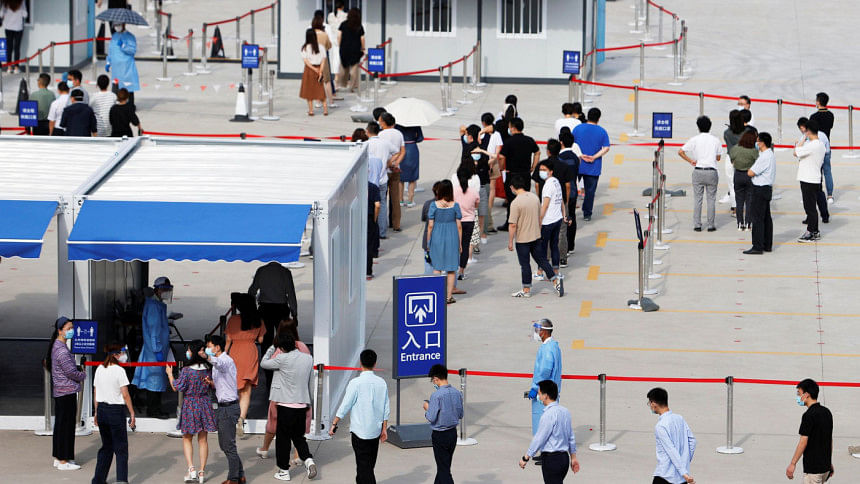For first time since July, China reports no new local COVID-19 cases

China reported no new locally transmitted cases of COVID-19 on Monday for the first time since July, a sign the current outbreak may be waning amid Beijing's 'zero-tolerance' stance and tough anti-virus measures across the country.
More than 1,200 people have been confirmed infected in an outbreak that officials said has been mainly driven by the highly transmissible Delta variant, which was brought in from abroad and caused a cluster in late July in the eastern city of Nanjing.
No deaths have been reported in the outbreak.
But it spurred authorities across the country to impose counter-epidemic measures including mass testing for millions of people to identify and isolate carriers, as well as travel restrictions of varying degrees. Economists have said they expect to see those steps cutting into growth in the world's second-biggest economy in the quarter ending September.
Across China, new daily local cases fell to the single-digit level last week, after peaking in early August.
Since the weekend, authorities have lifted lockdowns in a few areas in Beijing, as well as in the cities Wuhan and Jingmen in central Hubei province, after these cities had sealed up some areas to contain the virus. Sichuan has allowed travel agencies to resume tours to outside the province, barring places still deemed of risk.
By contrast, Shanghai placed hundreds of people under quarantine over the weekend after some fresh infections were reported, sparking concerns of a fresh outbreak in the city. Still, Shanghai reported no new local infections for Aug. 22.
ACCUSTOMED TO DISRUPTION
Experts do not expect China to alter its zero-tolerance playbook in the near future - even when facing just a handful of local infections.
"Although China's current (COVID containment) policy is characterised by a high degree of disruption as well as cost, a suite of effective measures has been established, which I don't think will be abandoned easily," said Chen Zhengming, professor of epidemiology at the University of Oxford.
"Inspections at customs, quarantine, the mobilisation of communities, mass testing, etc, one round, two rounds, and then three rounds, China has grown accustomed to them," Chen told Reuters.
The number of scheduled domestic flights for August has fallen 19% from a year earlier, according to global aviation data company Cirium, after the latest outbreak dented demand for travel and authorities allowed bookings to be cancelled free-of-charge. read more
Flights in and out of Nanjing and Yangzhou remained suspended as of Monday, although Nanjing said on Sunday that it no longer required people leaving the city by rail or by highway to show negative COVID-19 test results.
"Ordinary people are basically used to the measures without having too many complaints. And the effectiveness (of those measures) is discernible - case numbers recently have significantly declined," the University of Oxford's Chen said, though adding he doubted whether China could afford to impose such measures in the long run.
In the stock market, mainland China shares bounced back on Monday after last week's sharp drop. L4N2PU17J
Including new infections detected among travellers arriving in mainland China, the National Health Commission reported on Monday a total of 21 new confirmed cases for Aug. 22, down from 32 a day earlier.
China reported 16 new asymptomatic coronavirus cases, which it does not classify as confirmed infections until they show signs of infection such as a fever. That is down from 19 a day earlier. The new asymptomatic cases were all imported.
Mainland China as of Aug. 22 has recorded 94,652 confirmed cases, with a death toll of 4,636, unchanged since late January.

 For all latest news, follow The Daily Star's Google News channel.
For all latest news, follow The Daily Star's Google News channel. 



Comments